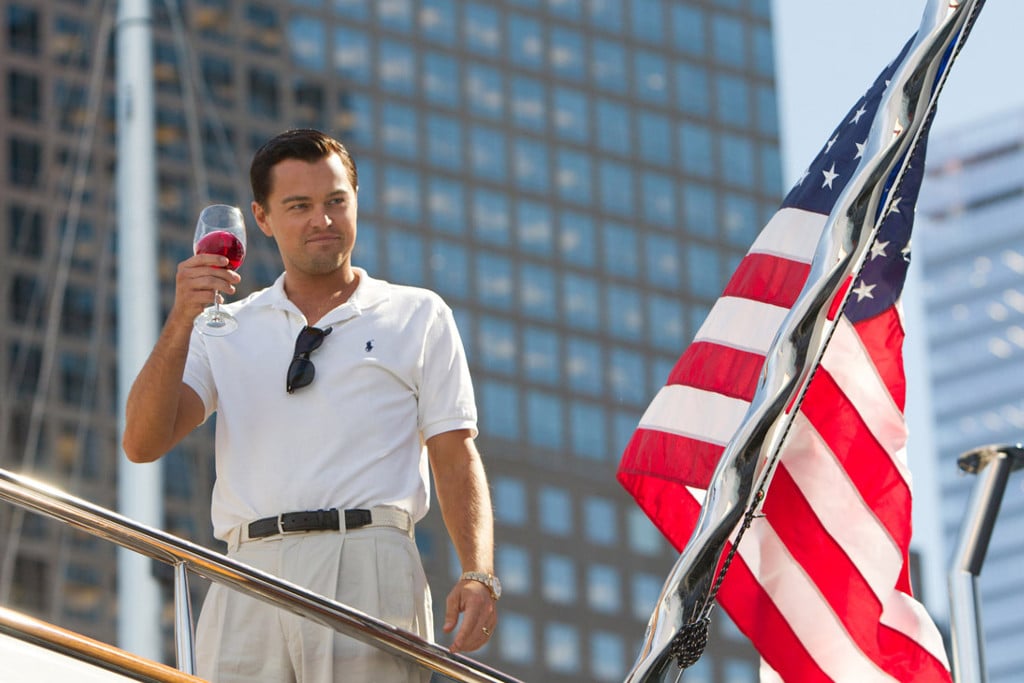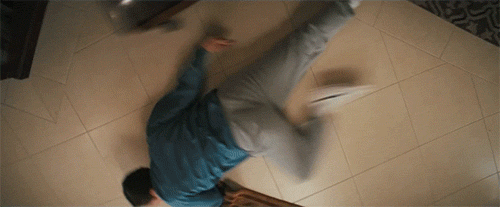Misogyny Isn’t The Wolf Of Wall Street’s Biggest Problem – Leo Is.
Remember the talented moppet who took interesting risks in artsy-fartsy films? What happened to that kid?

Good news for movie lovers, Scorsese apologists, and fans of the f-word: The Wolf Of Wall Street, a three-hour cinematic orgy chronicling the greedy, grubby true story of fallen New York stockbroker Jordan Belfort — who conned millions from unsuspecting schlubs during his reign in the late ‘80s and early ‘90s — finally opens in Australia tomorrow.
The film, which last week nabbed six Oscar nominations (among them Best Picture, Best Director and Best Actor for Leonardo DiCaprio), arrives on a wave of controversy centred on its lewd content, foul language (an intrepid journo at Slate tallied 544 variations on the word ‘fuck’), and questionable morals. Critical reviews from the US (where it opened on Christmas Day — because why wouldn’t you celebrate the Christ child’s birth by watching somebody snort cocaine from a hooker’s anus?) have been all over the map: The San Francisco Chronicle’s Mick La Salle thought it was “the best and most enjoyable American film to be released [in 2013]” and Rolling Stone’s Peter Travers hyperbolically called it a “cinematic landmark.”
On the other side of the aisle, New York’s David Edelstein slammed it as “thumpingly insipid”, while The Village Voice’s Stephanie Zacherek said it was “dreary, self-evident, too repetitive to be much fun even as satire.” Over at LA Weekly, Christina McDowell — whose father was a real-life victim of Belfort’s chicanery — wrote a caustic open letter to Wolf’s entire creative team (“You people are dangerous”) that basically implicates anyone who watches the film as endorsing Belfort’s unethical approach to making money and getting ahead.
I’m somewhere in between; I found it absurdly entertaining and deeply problematic. Much of the criticism lobbed at Wolf has centred on the misogyny underlying Belfort’s antics — the guy is a grade-A jerk who abandons his first wife for a gorgeous looker played by Gold Coast native and former Neighbours star, Margot Robbie (who, in her defence, delivers a star-making turn in a tricky role), and treats women, even the ones who work beside him, as little more than brainless playthings with breasts and a vagina. The guy is a tool.
But then, so are most of Scorsese’s antiheroes: he’s a copiously talented filmmaker, but the 71-year-old legend has a spotty track record when it comes to the female psyche (his CV’s high-point in that arena remains Alice Doesn’t Live Here Anymore, a dramedy about a struggling single mother that was made more than 40 years ago). So I wasn’t exactly expecting a feminist manifesto, or even an indictment of typical caveman boorishness from Wolf. Its milieu, after all, is the sweaty, testosterone-fuelled frat houses of lower Manhattan — whether set in the go-go Reagan era or today, this thing was always going to be a sausage sizzle by factual default. With Scorsese at the helm, the bro factor just gets ramped up further.
Wolf does boast a few very funny set pieces: early in the film, before the butt-numbing sets in, Matthew McConaughey makes a sly cameo as Jordan’s first boss, a feather-haired douche canoe who targets sex and cocaine as the secrets to success. A scene in which Jordan verbally destroys the FBI agent (Kyle Chandler, perfectly desperate) who’s climbed aboard his yacht rivals anything Tarantino’s done in its squirmy, slow-burn tension. The notorious dwarf-tossing segment is neither as hilarious or horrifying as you’ve been led to believe, and also no worse than 99 per cent of what happens in the Jackass movies. And the sequence in which Jordan drives his car after downing Quaaludes is an instant classic, the stuff of future Scorsese tribute reels, and probably what helped DiCaprio nab an Oscar nod against one of the toughest Best Actor fields in years.
But this is also an exhausting movie, and not just because of that run time. Somewhere in the second hour, it all starts to repeat itself. Sex, drugs, women, sex, drugs, women, manic pep talks, f-words, sex, f-words, screaming, drugs, sex, f-words, partying, drugs, women, sex, screaming, manic pep talks, sex, women, drugs… You get the point, yet Scorsese keeps drilling it home, anyway: This guy got away with it. And he kept getting away with it. Now let’s see how long I can get away with it! Like a bender with no end in sight, the movie grows panicky and hermetic; by the time Belfort launched into his umpteenth sermon of self-aggrandizement, I was just hoping the guy would be arrested, already.
Though it pains me to say, I’m also hoping DiCaprio never works with Scorsese again, either. Just as Belfort eventually backs himself into a corner of his own making, it seems Leo has reached the limits of his partnership with the director, which spans 12 years and five movies. None of those films were bad (though one viewing of Gangs Of New York is quite enough, thank you), but around the midpoint of Wolf, as Jordan screamed and flailed around his mansion like a spoiled thug, I thought to myself, “Haven’t we seen this before?”
Yes. Yes, we have. It happened in The Aviator and J. Edgar; to a lesser but still relevant degree, it’s also reminiscent of his poor-little-rich boy performance in last year’s The Great Gatsby. In fact, DiCaprio has played off the persona assigned him ever since he shot to super-stardom in the Titanic era — when he purposely dumped on his newfound celebrity (which he famously despised) as the de facto off-screen leader of the now-legendary ‘Pussy Posse‘ — one too many times. Even at this year’s Golden Globes, he seemed to openly embrace his long-standing playboy persona with an oily wink-and-nod after Tina Fey introduced him onstage: “And now, like a supermodel’s vagina, let’s all give a warm welcome to Leonardo DiCaprio.”
Uh, gross. Remember the Leo of yore — that preternaturally talented moppet who stole scenes from folks like Robert De Niro and Johnny Depp in small movies like This Boy’s Life and What’s Eating Gilbert Grape? The one who took interesting risks in artsy-fartsy films like The Basketball Diaries (teenager on heroin!), Marvin’s Room (mentally disturbed pyro!) and Total Eclipse, in which he channelled Arthur Rimbaud and laid one on David Thewlis? What happened to that kid?
In retrospect, even his big, career-reorienting turns in Romeo + Juliet and, yes, Titanic seem almost… minor compared to the work he’s taken since becoming king of the world; I can’t remember the last time I saw Leo onscreen and felt, as I so often did at the start of his career, like he was one of us. One of the most appealing facets of his early work was the rare — especially for his age — soulfulness he brought to bear every time. Even when he was raging (and few actors rage better than Leo), you still felt for the poor kid. That baby face felt like a front: each character he played already seemed to harbour a lifetime of anguish deep inside.
Post-Titanic, and especially in the Scorsese era, I’ve spied little to none of that sensitivity. Which is strange: it’s not as if he tired of playing oddballs and weirdos — pretty much every recent character in his filmography is exactly that. DiCaprio has never come across as particularly difficult in interviews, though he can seem guarded, likely a lingering effect of his long-running conflict with stardom and the press’ non-stop interest in the Lazy Susan of supermodels at his disposal. All these heavy roles — so wearying in Revolutionary Road, so unbearably nasty in Django Unchained — feel almost like a riposte for fame, much like his earnest charitable work on behalf of the environment.
Or one might reckon the lure of BIG! PAY CHEQUES! for BIG! LEADING ROLES! proved too irresistible, but that doesn’t really explain why he’s avoided balancing the blockbusters with the smaller, more intimate kind of work that first brought him notice. Plenty of his peers do. Christian Bale hasn’t let roles in the Batman and Terminator franchises stop him from poking around in the indie-film wilds where he honed his craft. Or look at Matt Damon, who opted for low-budget curios like The Informant! and Promised Land long after the Bourne and Ocean’s trilogies earned him zillions.
I’m not suggesting DiCaprio star in the next vapid romantic comedy that lands on his agent’s desk (though, hey, it would be nice to see what he’d bring to that kind of project). Perhaps he could take a cue from Joaquin Phoenix, whose own career boasts some interesting parallels. Back in 1989, when he still called himself Leaf, Phoenix gave a tender performance — one of his first — as Parenthood’s sullen pubescent, Garry.
He looked a lot like Leo, right? A casting agent thought so, too. The movie became a short-lived TV series (the current and far more successful second iteration began in 2010) with, yup, Leo in the role of Garry. The show didn’t last long, but it helped launch DiCaprio’s career; he took a similar role in the final season of the TV comedy Growing Pains before turning to film.
Phoenix’s first decade of steady film work began in earnest with 1995’s To Die For and was just as idiosyncratic as DiCaprio’s: Oliver Stone’s U-Turn, the underrated coming-of-age romance Inventing The Abbotts, bonkers period piece Quills, and blockbusters like Gladiator and Walk The Line. Like Leo, he didn’t much care for the intrusion into his personal life, which led to a very weird public implosion whose peak nadir was 2010’s pseudo-documentary, I’m Still Here. He rebounded nicely, though, with a fine turn in Paul Thomas Anderson’s The Master, and, most recently, the new Spike Jonze film, Her.
Her is a lovely film, and Phoenix carries nearly the entire thing himself. It is also the antithesis of Wolf, a thoughtful and delicate handiwork that chooses subtlety over stupidity. A film like Her is exactly what DiCaprio, who has yet to announce his next role, might want to consider. With apologies to Norma Desmond, it’s always seemed to me that as an actor, Leo is best when he’s small. It’s the pictures he’s chosen that keep getting bigger, all but subsuming his inherent charms in the process. That’s why a breakup with Marty wouldn’t be so bad. It might just compel him to go back to his roots, seek out a quieter, more introspective work and remind us why we all fell in love with him in the first place.
–
The Wolf Of Wall Street opens in cinemas nationally tomorrow.
–
Nicholas Fonseca is a freelance writer and editor and (sometime) master of film studies student based in Sydney. A former editor at Madison, Fonseca has written for WHO, Sunday Life and Foxtel magazines; prior to his arrival in Sydney, he was based in New York City, where he spent a decade as a staff member with Entertainment Weekly.


